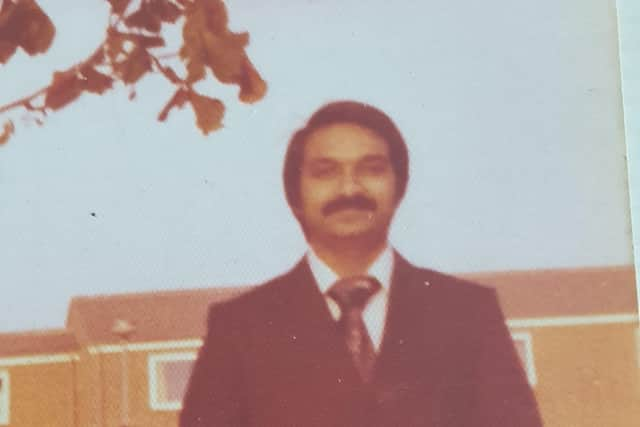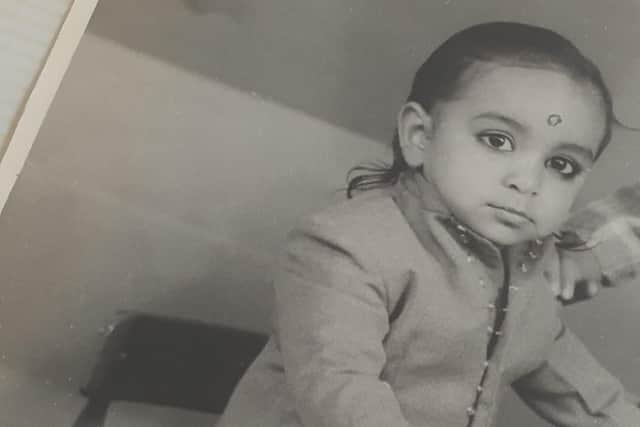Refugees forced to flee Uganda in 1972 share memories 50 years on
Nearing the airport in the country’s capital, Kampala, the family passed through yet another checkpoint.
“We had no more valuables by then,” he recalls. “My father had been strategic in bringing whatever jewellery and watches we had with us, knowing he would have to hand them over as payments whenever we were stopped. At the final checkpoint, when we didn’t have anything left, a guard spotted my mother’s earrings and tore them from her ears."
Advertisement
Hide AdAdvertisement
Hide AdIt was October 1972, two months after brutal dictator Idi Amin ordered all those of Asian descent to leave Uganda. Dr Joshi, a Deputy-Lieutenant of West Yorkshire, was one of around 80,000 refugees. Around 27,000 came to the UK.


To mark the 50th anniversary, Dr Joshi will be speaking at an event at the University of Bradford today, hosted by the University’s Deputy Vice-Chancellor, Professor Zahir Irani, whose family also left Uganda in 1972. Dr Joshi, 70, Chair of the Bradford Economic Partnership, says: “This was the first mass ethnic cleansing since the Second World War. It’s important to mark the anniversary because it’s our legacy and so the world will always remember what happened."
Dr Joshi’s grandfather, Liladhar Meghi ,migrated from the Indian state of Gujarat as a teenager in 1890, working first on the East African Railway, then establishing a successful business in Uganda with a staff of 35, importing and selling sewing machines, fabric and carpets.
In 1972, the family was living a comfortable lifestyle, with Dr Joshi’s father, Narottam, working in the family business. Dr Joshi, then 20, had just qualified as a pharmacist. “Uganda was my home,” he says. “I was Ugandan. Three generations of our family had lived there. Our business was there and that’s where I thought my future lay.”
Advertisement
Hide AdAdvertisement
Hide AdWhen Amin’s order came, families were given 90 days to leave the country. Dr Joshi, who fled with his parents, five younger sisters and his brother, recalls: “There was a huge sense of shock and disbelief. I can’t express in words the fear we had that one of us could be snatched and taken away. We knew it had happened and people were never seen again."


The family landed at Gatwick airport on October 23, 1972, with only the belongings they could fit into a small suitcase and £50, the maximum amount of cash they were allowed to bring. They spent six months being moved between Army camps in different parts of the UK.
Dr Joshi, a grandfather-of-two, says: “It was so cold at first, really freezing compared to Uganda, where it was so warm every day. My father immediately decided we wouldn’t be a burden on this country, we had to make our own way. He became warden of the first camp and one of my sisters translated for some of the elderly people who couldn’t speak English.”
They eventually found a home in Derby, in a one-bed terrace house, quite the change from their lavish lifestyle in Uganda where they had domestic help and nannies. Narottam found work as a supervisor at a clothing manufacturer while Dr Joshi's mother, Hira, who couldn’t speak English, stayed home to look after the children.
Advertisement
Hide AdAdvertisement
Hide AdDr Joshi says: “People in Derby made us feel very welcome. We didn’t care about living conditions or anything else, we were just happy to be safe and have a secure future.”
Despite his qualifications, Dr Joshi accepted an entry-level job as a lab technician and worked his way up, eventually ending his 27-year career as business development manager for AstraZeneca Pharmaceuticals. He and his wife, Bhavna, who have two grown-up children, moved to Bradford in 1981. Today, along with his work with the Bradford Economic Partnership, Dr Joshi was a founding governor and former chairman of Bradford Academy School, and now devotes himself to raising money for good causes through the Rotary.
Professor Irani’s story is similar. His grandfather arrived in Uganda at the turn of the century, as a young entrepreneur in search of his fortunes which he later established, with a portfolio of property and businesses. In 1972, Professor Irani was just a young child.
He says: “My dad has told me there was a sense of disbelief at first. Amin couldn’t possibly mean it, they thought, but it was too much of a risk to stay.”
Advertisement
Hide AdAdvertisement
Hide AdHis family settled in Bolton, but they returned to Uganda for a few years in the 1980s, after Amin was overthrown.
Professor Irani says: “There was great freedom then, which I loved as a teenager growing up after the initial shell shock of leaving Bolton and arriving in Kampala.
“It was a small population, and I could just get on my bike and cycle around nearby villages, where I learned the local language and became very much a ‘local’.” He has lived his life with his father’s words of wisdom ringing in his ears. “My father always told me, ‘You can take away anything from anybody, except their education.’”
Dr Joshi agrees. They know all too well what it’s like to lose everything in an instant.
Advertisement
Hide AdAdvertisement
Hide AdGuests at the invite-only event today will also hear from Lord-Lieutenant of West Yorkshire, Ed Anderson, and High Sheriff of West Yorkshire, Sue Baker.
Professor Irani said: “Bradford has a long and proud heritage of being a safe destination for refugees. We are delighted to host this event at the University to share stories and remember the experience of the tens of thousands of people who fled Uganda, the positive impact they have had on British life and the sanctuary that was offered to them.”